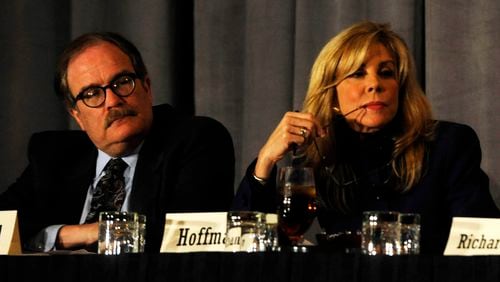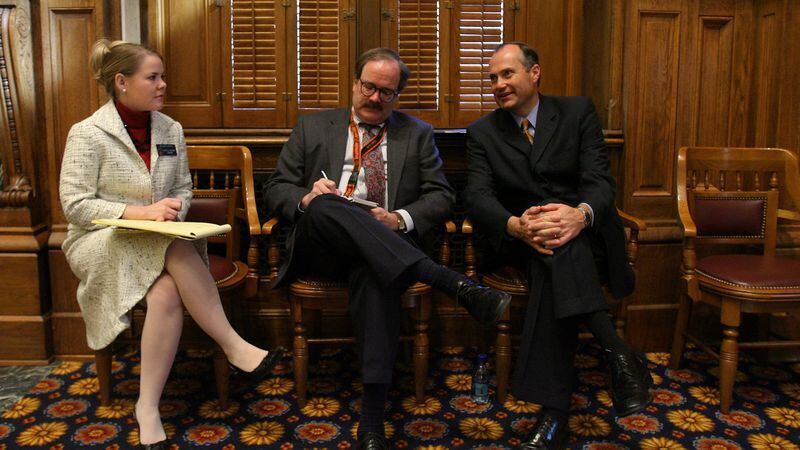Tom Crawford, the dean of state Capitol journalists who documented Georgia politics over more than three decades, has died. He was 67.
Crawford in May announced the end to his journalism career, leading to a steady stream of tributes and visits from politicians, power brokers and fellow reporters who bid him farewell. He died of complications from cancer, his family said Wednesday.
An endearing presence on the airwaves and in the press box, Crawford worked for a string of newspapers in Georgia over a long career as a reporter and editor, chronicling legendary Capitol figures and seismic political events such as the Republican takeover of state government.
And he pioneered a business model in Georgia that delivered news to two distinct audiences: an online subscription serviced geared largely to Gold Dome insiders and a weekly column featuring unvarnished analysis of state politics that was syndicated to mostly smaller and medium-size newspapers.
Crawford was a former editor of The Red & Black, the independent student newspaper in Athens, and later worked for The Marietta Daily Journal, The Montgomery Advertiser and The Atlanta Journal.
After a sojourn into public relations, where he worked as a speechwriter and public relations adviser during the 1980s and 1990s, he created Georgia Report – an innovative offering in what was then a crowded media landscape.
The subscription service instantly made a mark, catering to an underserved audience of lobbyists, lawyers and politicos that offered readers an incisive, detail-oriented window into the inner workings of legislators from his perch under the Gold Dome.
He also aimed for a more general audience with a weekly political column that ran in more than three dozen newspapers across the state. Many of those news outlets relied solely on Crawford to inform their readers of the happenings in state government, and he delivered with exacting precision.
Pete McCommons, a longtime friend of Crawford's and publisher of The Flagpole in Athens, wrote that he had "earned the freedom to tell us exactly what he saw up close in the Capitol, no matter whom he might offend – the governor, the speaker of the House, Georgia Power, Delta."
"Tom never pulled his punches, and it's surprising that he didn't get punched," he added, "because he worked daily at the Capitol, surrounded by all the people he scrutinized — powerful people who might not like the truths he spoke."
Crawford is survived by his wife, Lynn, and his stepson, Lindell Sellmansberger. He leaves an unmatched legacy of political reporting in Georgia that future journalists will soon study: He donated his work to the Richard B. Russell Library, where it will be available to the public.
Here’s a copy of his obit penned by a close Crawford friend:
Tom Crawford’s lifelong love affair with the written and spoken word came to an end this week, when he finally lost a 21-year battle with cancer. He was 67. At his death, Crawford was editor of the Georgia Report and dean of the State Capitol press corps.
A veteran journalist who had worked as a reporter for The Montgomery Advertiser, The Marietta Daily Journal and The Atlanta Journal, Crawford was an early pioneer of web-based journalism.
He founded The Georgia Report nearly 20 years ago and went on to cover three different gubernatorial administrations and the Republican takeover, following a century of Democratic rule, of the Georgia General Assembly. He also wrote a weekly column that ran in 35 newspapers throughout Georgia.
Recently Crawford was approached by the Richard B. Russell Library for Political Research and Studies at the University of Georgia about donating his papers to the library. He agreed, and more than two decades of his coverage of Georgia politics and state government will soon be available to students and others at the university.
Crawford took it as a compliment when the late Gov. Zell Miller once told him that he and his dogs used to get down on the floor at his home in Young Harris to watch him during his frequent appearances on Georgia Public Broadcasting’s “Lawmakers” program.
“As a journalist, you never knew quite what to expect from Zell,” Crawford said. “But I figured if his dogs liked me, I must be doing all right.”
Crawford was known to colleagues as an exceptionally versatile writer with a wicked sense of humor and a near-photographic memory.
“Tom really was a lifelong student of writers and writing,” said his long-time friend Charlie Hayslett, who worked with Crawford at The Atlanta Journal, at BellSouth Corporation and at Hayslett’s public relations firm. “He loved and appreciated the power of words and language, and I think it’s fair to say he practiced the art of writing at a very high level.”
Crawford was known throughout his working life as one of the fastest writers of his generation.
The late Prentice Palmer, a legendary political and governmental affairs reporter who mentored Crawford and dozens of other younger reporters at the old Atlanta Journal, once said of Crawford: “Tom doesn’t write stories, he vomits them.” It was a compliment. There were few deadlines he couldn’t beat.
“Tom really was blessed with one of the most remarkable minds I ever encountered,” said Hayslett. “For one thing, he never forgot anything. Before there was Google, there was Tom, and his recall was about as fast. For another, he had this uncanny ability to organize information, and to do it fast. And it really didn’t matter what kind of writing he was doing. I never worked with anybody who could switch gears like Tom could from, say, fairly simple straight news writing to something like a pretty involved speech and have virtually no drop-off in speed or focus.
“When we were working together as speechwriters, I’d have to go off and do a bunch of research and think about things for a while; Tom would just hit a different switch and immediately go from cranking out hard, factual information at roughly the speed of light to weaving together these elegantly written essays and speeches that pulled together just the right ideas in just the right ways to make just the right points,” Hayslett added. “Of course, it didn’t hurt that he had something close to the Library of Congress stuffed into the back of his head. That part almost wasn’t fair.”
Crawford’s one-man Georgia Report operation was headquartered in a single office on the back hallway of a building adjacent to the state Capitol. His door was often cracked, and passers-by could often catch a glimpse of a tipster passing a bit of information to Crawford, the reporter’s feet propped on his desk and hands clasped behind his head.
“The Georgia Report was aimed at lobbyists and those with a stake in legislation that went before the General Assembly, so details were important to Tom,” said Jim Galloway, political columnist for The Atlanta Journal-Constitution. “But then, through that weekly column that went out to dozens of newspapers, he used these large brushstrokes to convey what was happening to tens of thousands of readers. He’ll be greatly missed.”
Robert M. Williams, Jr., publisher of The Blackshear Times and other South Georgia weeklies, echoed Galloway’s point: “Tom Crawford filled a giant void for people in parts of the ‘other Georgia,’ with his wide contacts, long history and breadth of knowledge and understanding of Georgia politics. His weekly column was often the only real link our readers had with politics happening in Atlanta and at the Capitol since neither daily newspapers, nor television, in our faraway reaches cover that anymore. Tom didn’t mind calling out the powers-that-be, or offering roses, when they were deserved, and most readers appreciated his insight. His passing is a loss for many who never really understand the impact.”
An Atlanta native and a Crawford Long baby, Crawford grew up attending Atlanta public schools, including Grady High School, until his family moved to DeKalb County in the late 1960s. He graduated from Clarkston High School in 1968 and was accepted to both Georgia Tech and the University of Georgia.
Crawford initially planned to go to Georgia Tech, but changed his mind at the last minute and went to the University of Georgia, where he majored in journalism at the Grady College of Journalism and Mass Communication. He served as sports editor of the Red & Black and graduated Summa Cum Laude in 1972. Few people knew he was a member of Mensa International.
Crawford was also a student of local, national and international politics and always enjoyed a good discussion about the issues of the day. Most Tuesday nights would find him at Manuel’s Tavern, where he was a long-standing member of a self-styled “Government in Exile” group made up an ever-changing crowd of politicians, journalists, lawyers and other ne’er-do-wells. On Friday nights he could usually be found a few blocks away at George’s Bar and Restaurant with a handful of his old Atlanta Journal colleagues.
His death followed a 20-year battle with cancer that began when a melanoma appeared, oddly, on the heel of a foot. He was deeply appreciative of the care he received from Dr. David Lawson, NP Necia Maynard, their colleagues at The Winship Cancer Institute of Emory Healthcare, and his wife, Lynn Todd-Crawford.
He is survived by his wife Lynn; stepson Lindell Todd Sellmansberger; brother Garry K. Crawford (Linda); niece Paige Crawford, and an aunt, Ruby Garrett Roberts, all of Decatur.
In lieu of flowers, the family requests that donations be made to the Winship Cancer Institute of Emory University, Office of Gift Records, Emory University, 1762 Clifton Road, NE, Suite 1400, Atlanta, Georgia 30322.
About the Author









